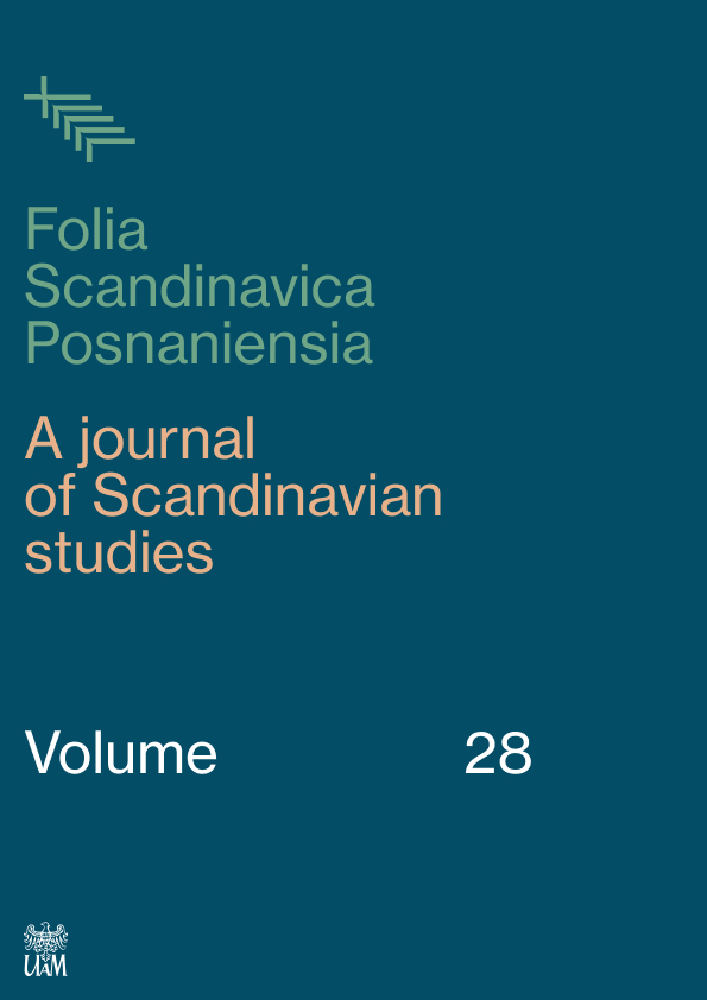Abstract
This paper addresses a phenomenon of the international success of Swedish female writers in the 19th century. I have focused on the Polish translations of Marie Sophie Schwartz’s works, which became extremely popular in the 1860’s and 1870’s, judging from the number of books translated in comparison to other Swedish bestselling writers. One of the most important issues for Schwartz was emancipation, specifically women’s right to education, employment and econo-mic autonomy. Her novel Emancipation Frenzy was translated into Polish in 1865 and 1876. Both translations differ as to the accuracy in rendering the emancipa-tion message. The earlier translation tends to omit or soften the author’s radical opinions on emancipation, which flattens the novel’s progressive message. The later one is closer to the original and articulates emancipation claims more faithfully. This probably has to do with the fact that the Polish emancipation de-bate was already more developed in the 1870s. That seems to confirm a funda-mental thesis of Translations Studies that translation not only communicates the message of the source text but also comprises an inscription of the host culture’s current standards and needs. Thus, the novels by Schwartz were initially read as popular literature, and over time they were perceived as socially engaged literature (Tendenzroman), which corresponded to the Polish nationalistic program.
References
Arping, Å. (2001). ”Främst bland alla författande Damer”. Bremer, kritiken och familjeromanens uppgång och fall. I: Å. Arping, B. Ahlmo-Nilsson (red.), Mig törstar! Studier i Fredrika Bremers spår (s. 27–48). Hedemora: Gidlund.
Boëthius. U. (1969). Strindberg och kvinnofrågan till och med Giftas I. Stockholm: Prisma.
Bohlin, A. (2017). Kök till vildmark. Det kvinnliga medborgarskapets spatialitet i nordisk 1840-talslitteratur. I: A. Borg et.al. (red.), Konstellationer. Festskrift till Anna Williams (s.79–93). Möklinta: Gidlunds förlag.
Burman, C. (2001). Bremer. En biografi. Stockholm: Bonniers.
Even-Zohar, I. (2004). The position of translated literature within the literary polysystem. I: L. Venuti (red.), The Translation Studies Reader. 2nd edition (s. 199–204). New York – London: Routledge.
Hammar, I. (1999). Emancipation och religion. Den svenska kvinnorörelsens pionjärer i debatt om kvinnans kallelse 1860–1900. Stockholm: Carlssons.
Holm, B. (1981). Fredrika Bremer och den borgerliga romanens födelse. Stockholm: Norstedt.
Ilnicka, M. (1868). Zofia Schwartz. Bluszcz 11, 62; fortsättning Bluszcz 12, 69–70.
Kolbe, G. (2014). Strategier för framgång. Marie Sophie Schwartz som föregångskvinna. Utg. H. Hanner, E. Lilja. Göteborg: Göteborgs universitet.
Kolbe, G. (2001). Om konsten att konstruera kvinna. Retoriska strategier i 1800-talets rådgivare och i Marie Sophie Schwartz’ romaner. Göteborg: Litteraturvetenskapliga institutionen.
Kulczycka-Saloni, J. (1985). Pozytywizm. I: Literatura polska. Przewodnik encyklopedyczny. T. II (s. 228–232). Warszawa: Państwowe Wydawnictwo Naukowe.
Kyle, G. (1987). Kvinnor och kunskap. I: G. Kyle (red.), Handbok i svensk kvinnohistoria (s. 111–136). Stockholm: Carlsson.
Larsson, L. (1993). Den farliga romanen. I: E. Møller Jensen (red.), Nordisk kvinnolitteraturhistoria. II. Fadershuset: 1800-talet (s. 319–327). Höganäs: Viken.
Leffler, Y. (2018). Det kvinnliga romanundret. Svensk 1800-talslitteratur i världen. Tidskrift för litteraturveten¬skap 1–2, 7–17.
Leffler, Y. et al. (2019). Swedish Women’s Writing on Export. Tracing Transnational Reception in the Nineteenth Century. Göteborg: LiR.skrifter.10.
Leffler, Y. (red.) (2019). The Triumph of the Swedish Nineteenth-Century Novel in Central and Eastern Europe. Göteborg: LIR.skrifter.9.
Leffler, Y. (2019). Transcultural Transmission: Emilie Flygare-Carlén and Marie Sophie Schwartz in Central and Eastern Europe. I: Y. Leffler (red.), The Triumph of the Swedish Nineteenth-Century Novel in Central and Eastern Europe (s. 7–31). Göteborg: LIR.skrifter.9.
Lewko, M. (1996). Obecność Skandynawów w polskiej kulturze teatralnej 1876–1918. Lublin: Redakcja Wydawnictw KUL.
Losman, B. (1987). Skrivande kvinnor. I: G. Kyle (red.), Handbok i svensk kvinnohistoria (s. 164–176). Stockholm: Carlsson.
Nawrocki, W. (1985). Klasycy i współcześni. Szkice o prozie skandynawskiej XIX i XX wieku. 2:a uppl. Poznań: Wydawnictwo Poznańskie.
Olivecrona, R. U. (1885). Szwecja. I: T. Stanton (red.), Kwestya kobieca w Europie. Övers. K. Sosnowski. Warszawa: Wydawnictwo Przeglądu Tygodniowego.
Orzeszkowa, E. (1893). Kilka słów o kobietach. Warszawa: S. Lewental. https://crispa.uw.edu.pl/object/files/411886/display/Default (20.11.2019)
Orzeszkowa, E. (1885). Polki. I: Stanton (red.). Kwestya kobieca w Europie. Övers. K. Sosnowski. Warszawa: Wydawnictwo Przeglądu Tygodniowego.
[Schwartz, M. S.] (1857). Till Sveriges mödrar om vanans makt vid uppfostran. Efter D:r Schewes åsigter, af * * *, Stockholm: Adolf Bonnier.
Schwartz, M. S. (1859). Sjelfkulturens Nödvändighet och Inflytande (Efter Psykologen Doctor Gustaf Scheve). Stockholm: J. L. Brudins förlag.
Schwartz, M. S. (1863). Några ord till Qvinnan (Om qvinnans uppfostran, Några ord om uppfostran, Om arbetets nödvändighet). Stockholm: J. J. Flodin.
Schwartz, Z. (1865). Marzenia i rzeczywistość. Gazeta Polska, 236–254.
Schwartz, M. S. (1867). Emancipationsvurmen. Berättelse. 2:a uppl. Göteborg: C. F. Arvidssons Förlag.
Schwartz, M. S. (1876). Gorączka emancypacyi. Opowiadanie. Övers. S. M. Warszawa: J. Kaufman.
Schwartz, M. Z. (1876a). Marzenia Gertrudy. Powieść. Övers. J. K. S. Warszawa: J. Kaufmann.
Schwartz, Z. M. (1877). Przyszłość Gertrudy. Powieść. Övers. T. S. Lwów: Gubrynowicz & Schmidt.
Stolpe, B. (1965). Emancipationsvurmen – en missförstådd tendensroman. Hertha, 2, 9, 18.
Svedjedal, J. (red.) (2012). Svensk litteratur som världslitteratur. En antologi. Uppsala: Uppsala universitet.
Szwartz [sic!], M. Z. (1864). Rodzina Romarhierta. Obraz z życia rzeczywistego. Gazeta Polska, 19–72.
Wasilewska-Chmura, M. (2018). De som inte fått vara med. Strindberg, kanon och kvinnolitteratur. I: M. Jazowy et al. (red.), Filologiskt smörgåsbord. Språk – översättning – litteratur (s. 87–106). Kraków: Jagiellonian University Press.
Wasilewska-Chmura, M. (2019). Marie Sophie Schwartz in Translation: Exporting Swedish Women’s Literature to Poland. I: Y. Leffler (red.), The Triumph of the Swedish Nineteenth-Century Novel in Central and Eastern Europe (s. 151–186). Göteborg: LIR.skrifter.9.
Venuti, L. (2004). Translation, Community, Utopia. I: L. Venuti (red.), The Translation Studies Reader. 2nd edition (s. 482–502). New York – London: Routledge.
Williams. A. (1997). Stjärnor utan stjärnbilder. Kvinnor och kanon i litteraturhistoriska översiktsverk under 1900-talet. Stockholm: Gidlund.
Öhman, A. (2002). Populärlitteratur. De populära genrernas estetik och historia. Lund: Studentlitteratur.
License
Copyright (c) 2020 Magdalena Wasilewska-Chmura

This work is licensed under a Creative Commons Attribution 4.0 International License.

